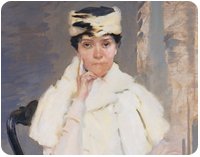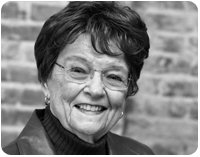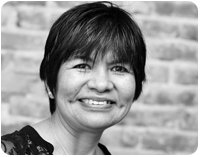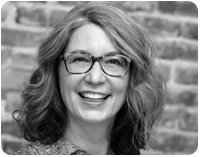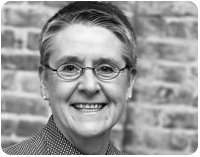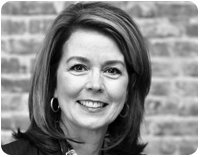
Deborah Clubb grew up on farms in Kentucky, roaming the hills and tobacco patches east of Louisville. Even as a little girl, she noticed differences in what her younger brothers were allowed to do. “They helped my father in the pig barn when my dad was breeding them, and I couldn’t go near it,” says Clubb. “They could also say some words that I better not try to say.”
W hile she could understand to some extent her father’s feelings, those differences lit a fire that was fanned by the feminism of the 1970s. At Transylvania University in Lexington, Clubb took a course called “Up Against the Wall, Mother” — a compilation of writing about women’s history, oppression, subjugation, and gender differences. That course gave her a “language” for the inequities she saw.
After graduate school at Northwestern, she was hired in 1978 by The Commercial Appeal as the first woman on the business news staff. “I came to cover agribusiness and I got to know the men in banking, in warehousing, in cotton brokerage,” she says. “Great people. But men, all of them.” After a few years of that beat, she adds, “I was sick to death of covering huge luncheons and dinners that honored one wealthy white guy after another.” The time had come, she vowed, to celebrate women’s contributions.
That decision led Clubb in 1984 to start Women of Achievement, which marks its 30th anniversary this year. Since its first event a year later, the organization has honored women in seven categories — courage, determination, heritage, heroism, initiative, steadfastness, and vision — all from various races, religions, and walks of life.
In planning the inaugural celebration, Clubb found the advocates she needed in Network, a group of women in law, banking, and other fields, which offered encouragement, professional guidance, and political support. With a $1,000 seed grant from Network endorsing the Women of Achievement project, Clubb and her steering committee spent the first year hammering out every aspect of the initial awards event.
Clubb credits the late Jeanne Dreifus of then-Memphis State University Women’s Task Force for her know-how and connections, and Judy Card, then of the Memphis Public Library, whose conference room became “our construction zone,” says Clubb. Other members of that co-founding steering committee — each representing endorsing organizations — were Beverly Booth Owen, Berkley Davis, Isha Echols, Judy Higbee, Patricia Howard, Mina Johnson, Happy Jones, Shirley Lupfer, Linda Pelts, Jane Sorin, Judy Wimmer, and Carol Lynn Yellin.
“Our event is not a fundraiser, and the honorees aren’t chosen based on wealth and power. Instead, we strive to represent the entire local community and women from all interests, faiths, backgrounds, and professions, living and dead.”
As they sought nominations for honorees, the group’s first requirement was that the candidate’s work be accomplished in Shelby County. Each candidate also needed a main nominator and at least two other supporters who could vouch for that person’s worth.
Most important, adds Clubb, “was the 300-word statement about what the person achieved. That was, and is, the ultimate guide for our final selection panels, the ultimate achievement,” she stresses. “Often that achievement has led to change. And change can be a hard business; it’s almost always resisted. So we celebrate, honor, and preserve the stories of these women who brought about necessary change.”
That first year more than 60 volunteers collected and reviewed dozens of nominations and organized the awards event. It was held at downtown’s New Daisy theatre on a Sunday evening in March 1985 and drew some 200 attendees. In the beginning, the names of winners were kept confidential. “I’m an Oscars freak,” smiles Clubb, “so I wanted it to be like the Oscars, a big surprise. We made a few careful calls to be sure the honorees would be there. Then in the early 1990s, we decided we’d get more ticket sales if people knew who’d be getting the awards. Since then, we’ve announced the honorees in advance.”
Over the years, Women of Achievement has published three spiral-bound books containing essays on each of the women honored. In addition to the 218 individuals recognized, “two astonishing groups of women are included,” says Clubb, “the Shelby County suffragists and the martyrs and heroines of the yellow fever epidemic of 1878.”
Clubb recognizes Judy Card — one of those on the founding steering committee and now with the First Regional Library in Hernando, Mississippi — for researching and writing most of the essays. “We want to get those books in the school libraries,” says Clubb, “so that girls and young women can learn about these honorees and what they achieved through determination, vision, courage, all the other qualities we value.”
Back in 1984, Clubb points out, the national observation of women’s history was allocated to one week. “Our event actually predates the National Women’s History Month, which Congress designated in 1987,” she says. “Our event is not a fundraiser, and the honorees aren’t chosen based on wealth and power. Instead, we strive to represent the entire local community and women from all interests, faiths, backgrounds, and professions, living and dead.”
After 30 years, the question sometimes arises, “Why do we still need to do this?” And inevitably at the awards program, as people listen to these stories, “we'll have this incredible surge of joy and surprise and weeping,” says Clubb. “And some women who hear the stories will walk out the doors with the courage to start a business or apply for a job or embark on a new venture. And we look around and say, ‘Oh, yeah, we still need to do it.’”
Besides her founding role in Women of Achievement, Clubb also serves as executive director of the Memphis Women’s Council, which works to change local policies for women and girls, and as coordinator of the Erase Domestic Crime Collaborative. Her efforts in these groups give her more reason not to rest on the laurels of past honorees. As she told attendees at the 2014 event, “With glass ceilings in every field, the gender wage gap, predominantly male state and local elected officials, and epidemic violence against women, we still need to hear these stories.”
On the following pages are profiles of the 2014 honorees. Some faces and achievements may be familiar to you. While others may not, their contributions could surprise and inspire you. “Learn from these women and their lives of commitment and struggle,” Clubb urged her audience in 1985. “They deserve our praise and our thanks.”
For a full list of all honorees, and for more information on Women of Achievement, go to womenofachievement.org or contact d.clubb@memphiswomen.org.


